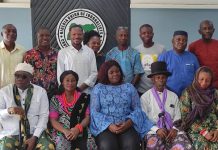Calabar – In an interview, Rt. Hon. Orok Duke, the NDDC Representative and Chairman of Canaan Table Tennis Club, shared heartfelt reflections on the recent loss of three members of his maternal family, including his niece, Akon Etim Ekpe. The interview shed light on the challenges within the Nigerian medical system and the personal impact on families facing critical health issues.
Late Akon Etim Ekpe, born on November 5, 1991, into the Ekpe family of Ubon Obong Simon Esien Ekpe, Odukpani Local Government Area, passed away on November 5, 2023, after a prolonged battle with cancer. In the interview, Rt. Hon. Orok Otu Duke revealed the harrowing experience of attempting to address Akon’s diagnosis, emphasizing the dire limitations of medical facilities in Nigeria.
Ako’s diagnosis was delayed for three years, and when it was finally addressed, the cancer had spread extensively. Despite the family’s efforts, including a significant financial commitment of close to N2 million for treatment, the limitations of Nigeria’s medical infrastructure became painfully apparent. Rt. Hon. Orok Otu Duke highlighted the challenges of treating cancer beyond the first two stages in Nigeria, citing the lack of early detection capabilities as a major concern.
Expressing his views on the broader issue of cancer, Duke leaned towards a conspiracy theory, suggesting that pharmaceutical companies worldwide may not prioritize finding cures for diseases like cancer and malaria, as their profitability is tied to ongoing treatments. He urged the public to be vigilant, detect health issues early, and manage them proactively.
Duke further addressed the systemic challenges in the Nigerian medical system, citing instances where investments in medical equipment lacked corresponding training programs for technicians. He underscored the need for continuous training and updates in the medical field to keep pace with evolving technologies.
The interview delved into the broader implications of the Nigerian system, drawing attention to instances where the lack of foresight in training personnel led to the underutilization of essential medical equipment. Duke cited examples of kidney dialysis machines lying unused due to a shortage of trained technicians.
On the topic of medical tourism, Duke lamented that Nigeria struggles to compete, as skilled medical professionals often seek opportunities abroad for better financial prospects and working conditions. He pointed out that without a robust financial foundation, Nigeria struggles to invest in the necessary infrastructure and expertise required to tackle complex medical issues.
Late Ekpe’s passing leaves a void in the Ekpe family, survived by her parents, siblings, and numerous relations who mourn her untimely departure.
As the nation reflects on the challenges within its medical system, the interview with Rt. Hon. Orok Duke serves as a poignant reminder of the urgent need for comprehensive reforms to ensure timely and effective healthcare for all Nigerians.










